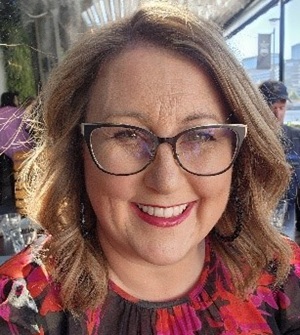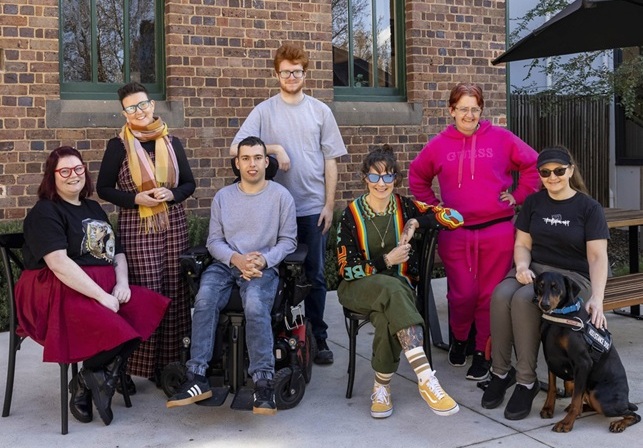Centre of Excellence in Disability Inclusion
As Victoria looks to improve educational and employment outcomes for people with disability, the state’s first Centre of Excellence in Disability Inclusion ![]() is powering up.
is powering up.
This Victorian-first centre is being led by The Gordon TAFE in Geelong and is being funded by the Victorian Government to improve access, inclusion and job outcomes for TAFE students with disability.
The seeds for the Centre were first planted around four or five years ago, when stakeholders from the education sector, industry and government joined forces to discuss barriers to employment and education for people with disability.

Samantha Noonan, project manager at the Centre of Excellence in Disability Inclusion, is currently working on the development of the centre’s operating model and implementation plan.
She said the model embeds co-creation with people with lived experience of disability right from the start – and this has been critical in focusing the mission and work of the Centre.
“Our co-creation strategy involves a mix of people [including] students with disabilities [and] subject matter experts, creating the operating model from their feedback through a series of workshops and discovery discussions,” she explained. “We have a team of seven students, past and present, between the ages of 18 and 52 doing different types of courses, representing all types of disabilities. They have been a very active voice in this project, so nothing is being created without them.”
Over the past several months, the team behind the Centre has expanded on some of the feedback to understand the key priorities that the Centre should focus on.

Alicia Martin, Raegan Cavagnino, Sharee Hocking and Trixie
Its key success measure is to make TAFE accessible for everyone. To do that, Samantha said the team had heard about many different barriers that will need to be dismantled to achieve equity in education for students with disability – from the application process, transitioning to further education, the learning experience and the transition into employment.
“We’ve looked at all of those pain points in the whole student journey and our programs of work are related to resolving those” she explained. The co-creators have been crucial in understanding those student experiences, Samantha added.
“It’s bringing the change to life. It’s giving them a voice. They feel heard, they feel understood, and most of them, for the first time, feel like they’re being recognised for those challenges and barriers that they’ve faced during their own lifetime.”
On its mission to create “a positive TAFE experience for all” – something Samantha acknowledged is “very ambitious”, the Centre will look at how to change the systemic pain points they have identified. There are some quick wins, like changing the format or type of student communication, as well as longer-term projects like how to increase the longevity of employment and reduce barriers to transitioning to the workplace.
For now, Samantha said they’re working on prioritising each program of work which will take place over a three-year time-frame. Once those programs have been identified, the plan is for the Centre of Excellence to act as an advocate to lead change across Victoria’s TAFE sector.
“[We will] promote best practice examples and set up and lead communities of practice and work groups – so if there’s a significant piece of work, it ensures a collective view on what that needs to look like and it creates consistency across all TAFEs,” Samantha explained. “What I’ve seen so far is there is inconsistency across all TAFEs in what that student experience looks like for people with disability, and certain TAFEs are doing parts really well. We need to collectively bring those together and scale them across the whole network. That is a big part of the Centre of Excellence’s role. Collaboration as a network is critical for this change.”
“In preparation for our launch, the Gordon have begun reviewing our current student supports. We need to practice what we preach, so we’re focus on making improvements now, before we open up the new building in 2027.”
Success will be defined by changes in key data points, like dropout rates for students with disability, feedback from students about their TAFE experience, students transitioning to employment or increases in the number of students disclosing their disability at enrolment.
But there’s a personal dimension to the project for Samantha too. “I’m neurodivergent myself, I have a spicy family, I have lots of lived experience,” she explained.
“Working with the range of disabilities and different perspectives and life experiences has been amazing. I feel like this project has the ability to be life-changing for nearly every student in the TAFE sector, and it can really change the dial in the way people learn and have a love of learning for the rest of their lives.
“I’m a big believer of that, having worked in learning development most of my career. I would love to see change in this space,” she said.
She’s confident the Centre of Excellence will help built capability and confidence in disability practitioners across the TAFE network – but also the disability support teams, educational development teams, and teaching teams. Through the resources and leadership provided by the Centre of Excellence, these teams will benefit from consistent information and learning to enhance the student experience.
Samantha encouraged TAFE staff to join the collective effort to provide a better experience for students with disability. “It is everyone’s responsibility to lead the change,” she said.
Written by: Danielle Kutchel
(August 2025)

